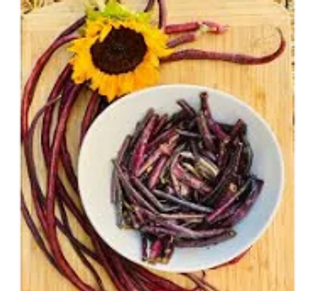Signed in as:
filler@godaddy.com
Signed in as:
filler@godaddy.com

Yard-long beans are a highly nutritious heat tolerant crop known for its extra-long pods. Best eaten while the pods are slender, young leaves and stems can also be eaten or used as animal fodder. Not to be confused with a common green bean, long beans are a relative of cowpeas (blackeye peas) that have been grown in Asia for more than 1,000 years. Today, they are commonly grown in China, Japan, India, Southeast Asia, the Pacific Islands, the Caribbean and parts of tropical Africa.

Yard-long beans are a highly nutritious heat tolerant crop known for its extra-long pods. Best eaten while the pods are slender, young leaves and stems can also be eaten or used as animal fodder. Not to be confused with a common green bean, long beans are a relative of cowpeas (blackeye peas) that have been grown in Asia for more than 1,000 years. Today, they are commonly grown in China, Japan, India, Southeast Asia, the Pacific Islands, the Caribbean and parts of tropical Africa.

Long Bean Data Sheet
Name:
Date and Time:
Air Temperature and Humidity
Evapotranspiration
Soil Temperature
Days after Planting
Growth Stage:
Irrigation Rate:
* Plant height:
Signs of Stress:
Signs of Disease:
Signs of Pests:
Signs of Predators:
Signs of disturbance in the perimeter
Upload Photos: Briefly describe what you took photos of.
*optional

While popular in Asian communities, many farmers choose not to grow them. They aren't well know by mainstream shoppers. hey are not generally known to mainstream consumers. Low demand is just one of the problems. The beans are prone to serious damage by aphids, which can cause farmers to apply insecticidal sprays, shutting them out of organic markets.

Asian Angelinos have an especially hard time finding healthy, culturally appropriate veggies that suit their taste preferences. Produce like long beans, daikon, taro and leafy green Asian veggies are not commonly found in most local grocery stores. This tends to result in purchases of processed foods that are much less nutritious. To improve nutrition for Asian Angelinos, organizations like the Los Angeles Food Policy Council and API Forward Movement would like to see more Asian fruits and veggies at farmer’s markets and in food assistance programs. [See LAist article.]
For our part, PEO has initiated a Long Bean Evaluation Trial at the Huntington’s Experimental Ranch Garden, where we are learning to grow, prepare and promote pesticide-free, non-GMO long beans. Our partners include UC Riverside crop researchers and UCCE Fresno’s advisors who work with Hmong farmers who grow long beans in California’s Central Valley.
Planet Earth Observatory (PEO) cares about long beans because we care about food equity. We care about what we grow, how we grow it, and who we grow it for.

Find out how Planet Earth Observatory has made a difference in the community and the lives of those we serve. We are committed to creating lasting change.

Find out how Planet Earth Observatory has made a difference in the community and the lives of those we serve. We are committed to creating lasting change.
Planet Earth Observatory
50 East Green St. #701
Pasadena, CA 91105
Email: lydia@planetearthobservatory.org
Planet Earth Observatory is a tax-exempt non-profit organization. EIN #87-1394657.
Copyright © 2018 Planet Earth Observatory
All Rights Reserved.
We use cookies to analyze website traffic and optimize your website experience. By accepting our use of cookies, your data will be aggregated with all other user data.